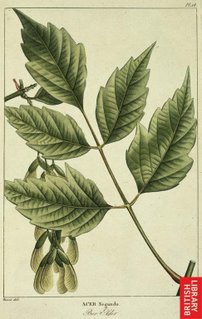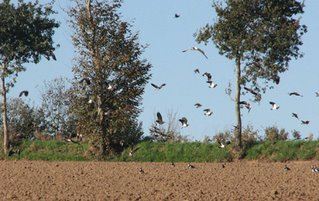
The box elder grew near the bottom and to the side of the garden, how it came to be there I don't know, I think our garden had once been a part of a large house's estate and parkland, so perhaps it had been planted as a specimen then. As I have said, we didn't know it was a box elder, but called it the maple tree. My mother said it was a field maple, but field maple I know, and they do not look like this. They are delightful, I think, chiefly for their quality of going almost utterly unnoticed in the hedgerows all year, then bursting into yellow flame in autumn which shows off the perfectly balanced shape and size of their palmate leaves. Our maple tree's leaves, however, were not palmate but pinnate, which long troubled me. Was it really a maple at all? I never did like to be guilty of misnomer.
I have now learned that pinnate leaves are indeed exceptional in the tribe of maples, along with the box elder's property of being dioecious, that is the tree is either male or female, not both at once, and therefore cannot self-fertilise. Our tree, sometimes called, facetiously, Mabel, and therefore 'she', was genuinely female, but her rarity in the small town in the home counties where we lived was such that her winged fruit were always hollow and empty, evidently there was no male box elder close enough to do the business. Though I have seen many since, mostly in France, and usually in street plantings, often interspersed with red-leaved malus or prunus for contrast, I have never seen one as tall as this one, which must have been at least ten metres. A very small boy once delighted my mother by running down the drive round to the back of our house with his apologetic mother in panting pursuit, who explained that he had caught a glimpse of the tree from the road and had to come and see it because he was besotted with trees.
It seemed to me an original, but not self-consciously clever name for the blog. When I subsequently googled the name however, as is wont to happen, it was not so unusual as I thought. Not only did I find the picture above, from a French volume of botanical prints of native North American trees of 1813, but also discovered that Box Elder is a county in Utah, with some quite impressive public buildings, a track on at least two indie albums, and that the box elder bug is a troublesome pest on all maple trees. The timber is of little worth, though the tree can be tapped for sugar syrup, and although it is native, its tendency to colonise waste ground at the expense of more vulnerable species in America has led to box elder being seen as a weed. Although attempts have been made to breed ornamental varieties from the variegated and pale pink sports which I remember sometimes appearing in the offshoots, the tree has a disappointing propensity to revert to ordinairy, unremarkable type, something I can recognise.
But I remembered the tree with great affection; I felt that she had an admirable nature, a gently sheltering character of modest beauty, interest and elusive rarity without appearing showily exotic. Seeing them often planted in town streets, I assumed that they must be amenable and resilient without invasive or destructive habits such as undermining sewage pipes.
She was adequately obliging in childhood games; the bright green, flexible shoots which sprouted abundantly around the bole made climbing the tree difficult - as did a habit of growth where the first fork was high off the ground and the branches sprang too vertically from it - but the shoots were quite fun break off and play with, as pretend riding crops to gee up pretend horses around jumps made from garden canes and clothes pegs. The empty keys spun prettily as helicopters.
Let me say now that I had a happy childhood. I had my share of disappointments and difficult times, and the things I'm often now grateful for were also the things which were sometimes a source of feeling different, excluded, insecure. I was, and still am, though I hope I have tried to swim against the current of my nature, introvert, sometimes odd, and inclined to a lazy timidity and know-it-allness. I was, quite frequently, a fairly horrible child and young person. I am sometimes curious, how much remorse one is required to feel over childhood actions. I do feel some. The composer John Tavener, when asked if he had any regrets, said something along the lines that naturally he regretted the sins of youth, but that is in the nature of youth, and as he grows older he finds he looks at his youthful self with increasing gentleness and compassion. This desirable combination of detachment and compassion seems easier to achieve towards one's past self than towards others, alas.
My parents were old when they had me, and I was the last of six. They were kind and indulgent, had less energy to shape my upbringing positively as they had with my elder siblings, but my mother spent much time talking and sharing experience and knowledge with me - not an unmixed blessing, but which ones are? My father suffered a mature onset of epilepsy when I was very small, and was on phenabarbitone for the rest of his life, which was one factor in what seemed his general effacement of himself, another were to do with my mother and her sense of disappointment, I think. Until I was six though, the vigour and optimism which I feel should play a part in good childrearing were made up for by my three oldest siblings, war and just post-war babies who had known just enough privation to give them drive and appreciation of their opportunities, and ample talent to secure those opportunities when they became enthusiastic young 1960s adults. In addition to themselves and their interests they brought home adorable and doting boyfriends and girlfriends, husband and wives, all of which ensured I was thoroughly spoiled.
Then the lure of the wider world drew them on, and they departed variously to Australia, South Africa and Bermuda. Second sister, always caught painfully between those three and we two smaller ones, suffered badly at the loss of them, her adolescence seemed thenceforward hedged about with storm clouds and eggshells, and though she was never unkind to me, often very lovely and loving, and later a fine friend indeed, she was frequently unapproachable, and a source of puzzling chagrin to our parents. To this day, she and I find airport farewells difficult. I heard an echo of this particular sense of loss at the diaspora of young people from Britain at this time from Ray Davies of 'The Kinks', who said that the song 'Waterloo Sunset' was written in a spirit of sadness at the parting from of a sibling's family, including a beloved nephew, the Terry of the song, who had emigrated to Australia ( I think...), and its wistful, elegiac quality is a reflection of that. I'm not a big Kinks fan, but I do like 'Waterloo Sunset'.
Let me say now that I had a happy childhood. I had my share of disappointments and difficult times, and the things I'm often now grateful for were also the things which were sometimes a source of feeling different, excluded, insecure. I was, and still am, though I hope I have tried to swim against the current of my nature, introvert, sometimes odd, and inclined to a lazy timidity and know-it-allness. I was, quite frequently, a fairly horrible child and young person. I am sometimes curious, how much remorse one is required to feel over childhood actions. I do feel some. The composer John Tavener, when asked if he had any regrets, said something along the lines that naturally he regretted the sins of youth, but that is in the nature of youth, and as he grows older he finds he looks at his youthful self with increasing gentleness and compassion. This desirable combination of detachment and compassion seems easier to achieve towards one's past self than towards others, alas.
My parents were old when they had me, and I was the last of six. They were kind and indulgent, had less energy to shape my upbringing positively as they had with my elder siblings, but my mother spent much time talking and sharing experience and knowledge with me - not an unmixed blessing, but which ones are? My father suffered a mature onset of epilepsy when I was very small, and was on phenabarbitone for the rest of his life, which was one factor in what seemed his general effacement of himself, another were to do with my mother and her sense of disappointment, I think. Until I was six though, the vigour and optimism which I feel should play a part in good childrearing were made up for by my three oldest siblings, war and just post-war babies who had known just enough privation to give them drive and appreciation of their opportunities, and ample talent to secure those opportunities when they became enthusiastic young 1960s adults. In addition to themselves and their interests they brought home adorable and doting boyfriends and girlfriends, husband and wives, all of which ensured I was thoroughly spoiled.
Then the lure of the wider world drew them on, and they departed variously to Australia, South Africa and Bermuda. Second sister, always caught painfully between those three and we two smaller ones, suffered badly at the loss of them, her adolescence seemed thenceforward hedged about with storm clouds and eggshells, and though she was never unkind to me, often very lovely and loving, and later a fine friend indeed, she was frequently unapproachable, and a source of puzzling chagrin to our parents. To this day, she and I find airport farewells difficult. I heard an echo of this particular sense of loss at the diaspora of young people from Britain at this time from Ray Davies of 'The Kinks', who said that the song 'Waterloo Sunset' was written in a spirit of sadness at the parting from of a sibling's family, including a beloved nephew, the Terry of the song, who had emigrated to Australia ( I think...), and its wistful, elegiac quality is a reflection of that. I'm not a big Kinks fan, but I do like 'Waterloo Sunset'.
Third brother, nearest in age to me, was and is, a dear, but a sport, in the botanical sense; tall and large boned among the stocky or wiry, medium-statured rest of us, with tightly curled hair and bad handwriting ( we mostly write a fair italic, remarkably alike at times ) and a daunting, irrepressible, eccentric intelligence which isn't always easy, and a secret, quiet, resilient pride which made it impossible for him to share the problems this brought. He was a mentally stimulating, if sometimes infuriating, companion.This brother claimed, at a very young age, to have an imaginary friend who lived 'in the parish room, behind the maple tree '. His/her name is lost in the mists of time.
However, three years later, a blink of an eye in an adult life, second brother and my sister-in-law came back from Bermuda, and bought one house then built another in Herefordshire. I was going throught the pre-adolescent tomboy stage, which I understand at Steiner Schools is written into the curriculum, of wishing explore the wilds, to build camps and tree-houses and sail away in small boats and generally pretend to be living 'Swallows and Amazons'. I loved Herefordshire and the Welsh Marches in general, walks in the Brecons and on Hergest Ridge, watching the boats on Llangorse Lake. I never made much of a sailor, but for Christmas I had a rope ladder, which second brother scrambled up and secured in the fork of the box elder tree, and, wearing a pair of rope-soled shoes found, before espadrilles became common or fashionable, in a yacht chandlers in Falmouth, I would climb up into the branches. There wasn't much in particular to see or do up there, but it gave a sense of satisfaction to be there.
Then, some further three years later, first sister lost her young husband tragically in a sailing accident in the Indian Ocean, and returned with three very small children, my nephew and twin nieces. Now in full surly adolescent mode, and accustomed to the distance of my extended family, I was often disgruntled and graceless about suddenly having four extra people about the place. The little ones were fairy-slight, Midwich-cuckoo blonde, ravishingly beautiful, South African raised and bathed in a glamour of tragedy. Our mother fed them enormous portions of chocolate cake then wondered why we endured battles and petulance and an hour or so later when they wouldn't eat their dinner. Now, despite difficult adjustments and step-family arrangements, they are the kindest, gentlest, most forgiving and even tempered people I know, and amongst those I love most in the world.
The first winter of their return, my sister and I spent the Christmas holidays watching old films, and when more family members arrived for the festivities, third brother was packed off to sleep in the caravan under the maple tree. This was towed around the country for holidays and served as summer house and spare room the rest of the time. Sleeping out there, even in winter, was no hardship, and indeed a privilege I envied him. New Year brought gales, and a call came one evening, some time before my brother, who always kept late hours, went off to bed. A tree was down in the garden, and we rushed out in the windy dark to see. The maple tree had very gently and carefully, it seemed, laid herself down athwart the end of the garden, the light, flexible outer twigs and branches overlaying but not damaging the caravan, the rest of the body of the tree positioned between the bramley apple tree and the raspberry canes. No injury was done in the fall to human, animal or plant life.
My newly returned nephew ( now a well-set up fellow who roves the wildernesses of the world, managing national parks and being a UN volunteer, and also a fair hand at woodturning I think) and I had fun the rest of the winter trying to break and saw up what we could of the tree, using anything that came to hand: old bow and tenon saws, woodshed hatchets, whatever, before some responsible adult presumably moved in with a chain saw. I remember him sitting astride the trunk after the point where I was sawing in order to put enough weight on it to open and ease the saw cut, and cheerfully falling on his backside when the bough broke.
The box elder provided firewood for the remaining time we lived in the house, for we had no central heating but still an open fire in one room at least ( gas, North Sea of course, in the others). I don't remember particularly grieving the tree, things passed. But the maple tree is a fond memory, and many of her qualities, and the way she lived her life, I wouldn't be ashamed to emulate.






